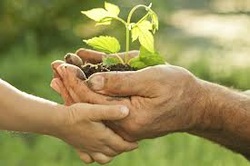
I thought it might be interesting to see what is out there on this dichotomy that stretches far beyond sexuality. Below are two different talks that address this issue. The first is an explanation by University of Illinois Professor Gene Robinson. Although this study is done in bees and leaves me with far too much of a sociobiology taste (he even refers to his studies as 'sociogenomics'), it does do a great job of addressing nature and nurture even if this is applicable to humans in a much different way. In bees, older individuals are foragers while younger individuals are nurses, staying in and tending the hive and offspring. Sometimes, however, a large number of older bees will perish and the colony needs new foragers. What occurs is that younger bees will prematurely adopt the forager position in the colony. What is important here is the ability of these bees to respond to the environment in adopting this new position - bees will only do this in response to a decline in foragers. The genome of the bees changes as they become older and adopt the forager role, a result of gene activity. What is interesting is that these younger bees that adopt a forager role possess a genome that looks similar to that of the older foragers - meaning they changed their biology - their genes - as well.
What does this mean? The bees appear to be able to change their genes in response to changes in their environment, which lies somewhere in between the nature vs. nurture dichotomy. In this case it appears the nature and nurture are just 'two horns of the same bull' as described in the video - both effect behavior by acting on the genome. Something to point out here is that the genome does not necessarily equal genes in this case - we now know that biology goes beyond this and the inherited genes can be differentially expressed by other genetic means.
The second video is quite a bit shorter and probably a bit more related to the topic of this website. Here Dr. Louann Brizendine describes how we get our gender identity - is it inborn or does it come from how we are raised? She describes our biology as giving us predispositions towards certain behaviors. However, how we are socialized when young has a huge effect on shaping and reshaping our brains - most often in very stereotypical 'masculine' and 'feminine' ways that we are taught by our parents and by society. Neither is the complete answer - both have a role.
Both videos seem to support what I believe about the nature vs. nurture dichotomy - it's bull. Rather, who we are and how we behave is affected by both our biology and our environment in varying ways. Nature and nurture is not a dichotomy, but a continuum, the effect each has varying depending on what you are looking at. As with any question in science, there is no clear cut answer, and this is no exception. Keep this in mind while going through the research on this site and and any information you see in society. Also, please take the time to watch both of these short and informative talks I described above, which are embedded below.
Levi
| | |
 RSS Feed
RSS Feed